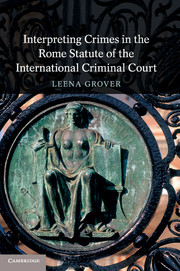Book contents
- Frontmatter
- Dedication
- Contents
- Foreword
- Acknowledgements
- 1 Introduction
- 2 The state of the art
- 3 Guiding interpretive principle
- 4 Challenges to the principle of legality
- 5 Operationalizing the principle of legality
- 6 Custom as an aid to interpretation
- 7 Internal indicia of codification
- 8 External indicia of codification
- 9 The Vienna Convention (1969) and aids to interpretation
- 10 Conclusions
- Bibliography
- Index
- References
4 - Challenges to the principle of legality
Published online by Cambridge University Press: 05 November 2014
- Frontmatter
- Dedication
- Contents
- Foreword
- Acknowledgements
- 1 Introduction
- 2 The state of the art
- 3 Guiding interpretive principle
- 4 Challenges to the principle of legality
- 5 Operationalizing the principle of legality
- 6 Custom as an aid to interpretation
- 7 Internal indicia of codification
- 8 External indicia of codification
- 9 The Vienna Convention (1969) and aids to interpretation
- 10 Conclusions
- Bibliography
- Index
- References
Summary
Introduction
In the previous Chapter, the normative tensions underlying international criminal law were described and their appearance in the Rome Statute made plain. It was argued that article 21(3), which obliges judges to interpret and apply the Rome Statute in a manner consistent with internationally recognized human rights, and article 22, which contains a strict legality standard, could be understood as entrenching two (mostly) opposing normativities for the purpose of interpreting crimes in the Statute. Absent any harmonizing methodology, judges favouring the liberal interpretation of crimes could invoke the former provision, and those favouring their strict construction could rely on the latter. A brief review of the ordinary meaning of these provisions in their context and in light of their object and purpose as well as their drafting histories, however, unearthed their potential to be reconciled, and an attempt at such coherence was made. The main thesis advanced was that the legality imperative in article 22 is to be the guiding interpretive principle for crimes in the Rome Statute against a background presumption that the Statute’s drafters defined the crimes in a manner that does not violate the internationally recognized human rights of the person investigated, prosecuted or convicted. However, the content of the legality principle for purposes of interpretation was not examined in detail. In the absence of such an inquiry, it is difficult to envision how, in practice, article 22 might assist judges in carrying out their interpretive work. Accordingly, the goal of the next two Chapters is to fully unpack the content of the nullum crimen sine lege imperative with a view to achieving the principled ‘operationalization’ of article 22 for purposes of interpreting the crimes in the Rome Statute.
- Type
- Chapter
- Information
- Publisher: Cambridge University PressPrint publication year: 2014



